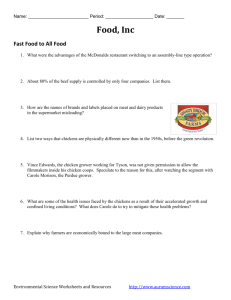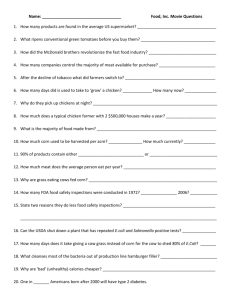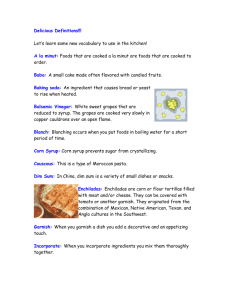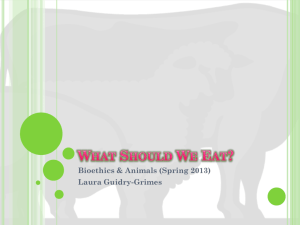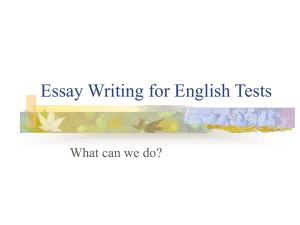Meat Production & Environment: A Critical Analysis Essay
advertisement
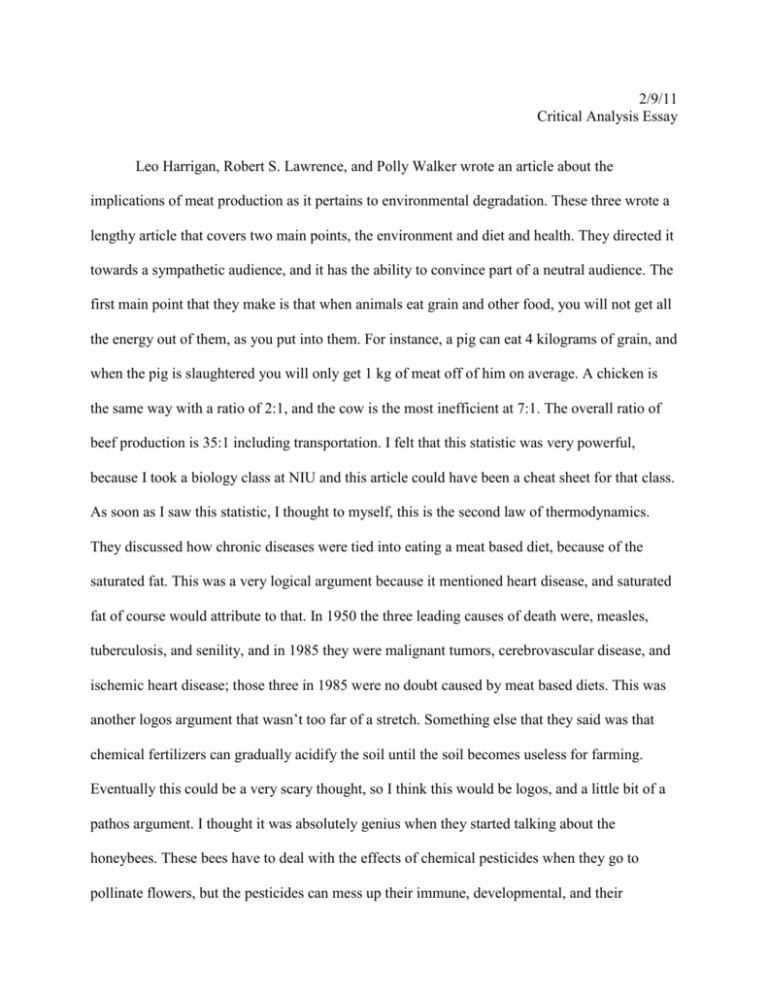
2/9/11 Critical Analysis Essay Leo Harrigan, Robert S. Lawrence, and Polly Walker wrote an article about the implications of meat production as it pertains to environmental degradation. These three wrote a lengthy article that covers two main points, the environment and diet and health. They directed it towards a sympathetic audience, and it has the ability to convince part of a neutral audience. The first main point that they make is that when animals eat grain and other food, you will not get all the energy out of them, as you put into them. For instance, a pig can eat 4 kilograms of grain, and when the pig is slaughtered you will only get 1 kg of meat off of him on average. A chicken is the same way with a ratio of 2:1, and the cow is the most inefficient at 7:1. The overall ratio of beef production is 35:1 including transportation. I felt that this statistic was very powerful, because I took a biology class at NIU and this article could have been a cheat sheet for that class. As soon as I saw this statistic, I thought to myself, this is the second law of thermodynamics. They discussed how chronic diseases were tied into eating a meat based diet, because of the saturated fat. This was a very logical argument because it mentioned heart disease, and saturated fat of course would attribute to that. In 1950 the three leading causes of death were, measles, tuberculosis, and senility, and in 1985 they were malignant tumors, cerebrovascular disease, and ischemic heart disease; those three in 1985 were no doubt caused by meat based diets. This was another logos argument that wasn’t too far of a stretch. Something else that they said was that chemical fertilizers can gradually acidify the soil until the soil becomes useless for farming. Eventually this could be a very scary thought, so I think this would be logos, and a little bit of a pathos argument. I thought it was absolutely genius when they started talking about the honeybees. These bees have to deal with the effects of chemical pesticides when they go to pollinate flowers, but the pesticides can mess up their immune, developmental, and their reproductive systems. It was just interesting to hear about another animal that wasn’t a traditional farm animal being effected by the pesticides. Not only are the grains hard to keep alive, but if we reduced meat consumption that could help “alleviate land scarcity because 37% of the world’s grain, and 66% of the US grain production, is fed to livestock.” Water is expensive when it comes to agriculture. Meat production is even more strenuous on water supplies; 100 times more water is required to produce equivalent amounts of protein energy from grains. Overall I thought that these were some of Horrigan’s, Lawrence’s, and Walker’s best arguments; however, they didn’t always think the same way I did. For instance, they raised the possibility of a more sustainable food system by having closer connections between the producer and the consumer. I don’t think this would work at all. The best case scenario is that each community is selfsufficient, and they would be satisfied with what they can produce, and not want more than that. Knowing the greedy nature of humans, especially in the US, this is simply not feasible. The next scenario that they introduce was ludacris. They said that only .1% of applied pesticides reach their target pests, leaving the other 99.9% to run rampant. That is fine, but then they say that this can disturb the balance of predator and prey. Simply, the .1% of the prey is going to affect a large number of the predator to throw the ecosystem out of balance. The second part of this argument is completely contradictory and fallacious. The last flawed argument that they presented was about biodiversity. They said, “agriculture is dependent on biodiversity for its existence and, at the same time, is a threat to biodiversity in its implementation. One way that agriculture depends on biodiversity is in developing new varieties of plants that keep pace with ever-evolving plant diseases.” I get what they are trying to say, but isn’t developing more and more species of corn biodiversity? Granted they won’t all be used, but at least they are there to make more and more kinds of corn that could, theoretically, be super corn and be immune to everything. They explain that they take a strain of corn, and pollinate it with a wild version that can withstand whatever they are trying to resist; the same could be done with old strains of corn. However, I felt that this paper was somewhat irrelevant when this next argument was introduced. They stated that “humans have practiced agriculture for more than 10,000 years, but only in the past 50 years or so have farmers become heavily dependent on synthetic chemical fertilizers and pesticides and fossil fuel-powered farm machinery.” This makes perfect sense because the world population has grown exponentially in the past 10,000 years, and so has the technology. Since these two go hand in hand, it makes sense that they have to balance out at one point. They were both very low those 10,000 years ago, and now they seem to have balanced out again. Except that the Earth can only handle so much, and eventually crops won’t be able to grow as well, or as fast, and the world population will starve. That day may be a long way away, but either the human population has to have a cap on it, or the technology has to evolve once more to increase the Earth’s carrying capacity. This whole story about the meat production industry destroying the planet one harvesting season at a time was overall good, and it got the point across, but I know since I would classify myself as a hostile audience, I will criticize as much as possible. I do think the authors did a good job about getting their point across. I, however, would not have written a global warming, environmental Armageddon story much differently. I would write it more as a list of all the things that were going wrong, and then I would attack the people that were causing the problems. That would probably not get much done, but my argument would be clear; it would go something like this. Ultimately, the Earth is not safe is we continue on the same path, so we need to change the way we live, or hope for a miracle technological breakthrough.

